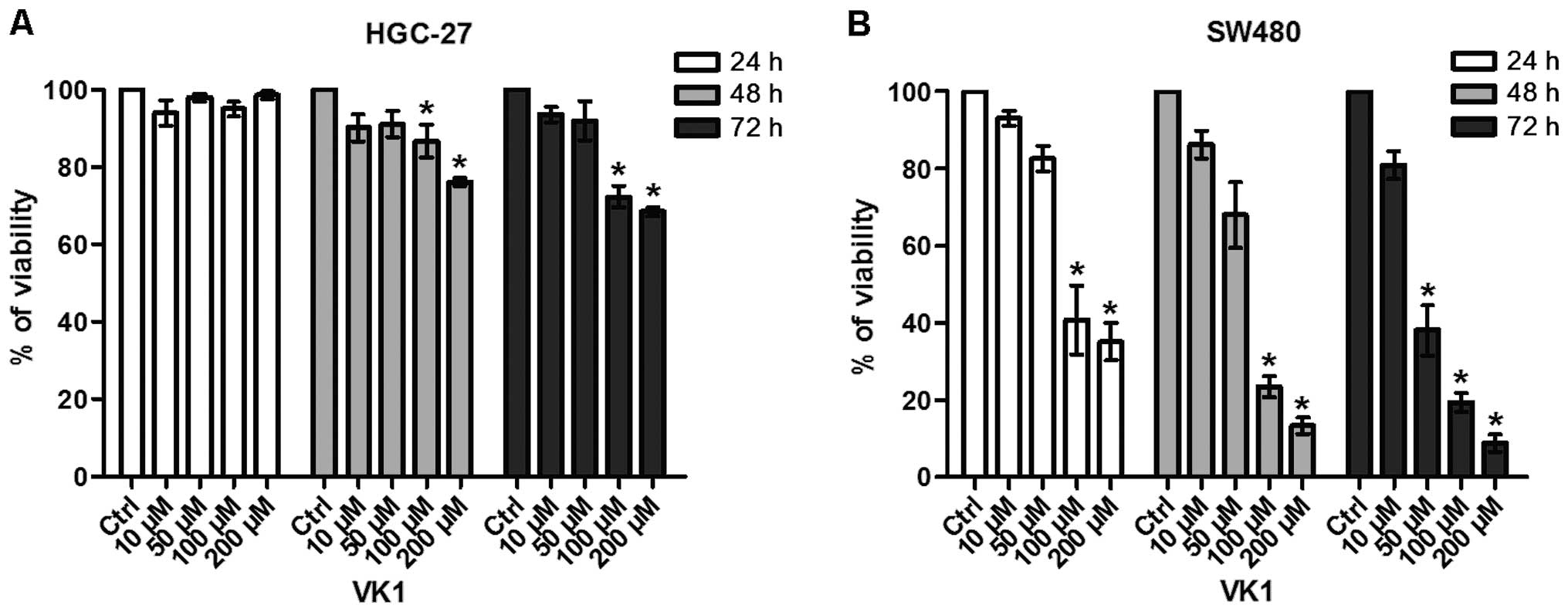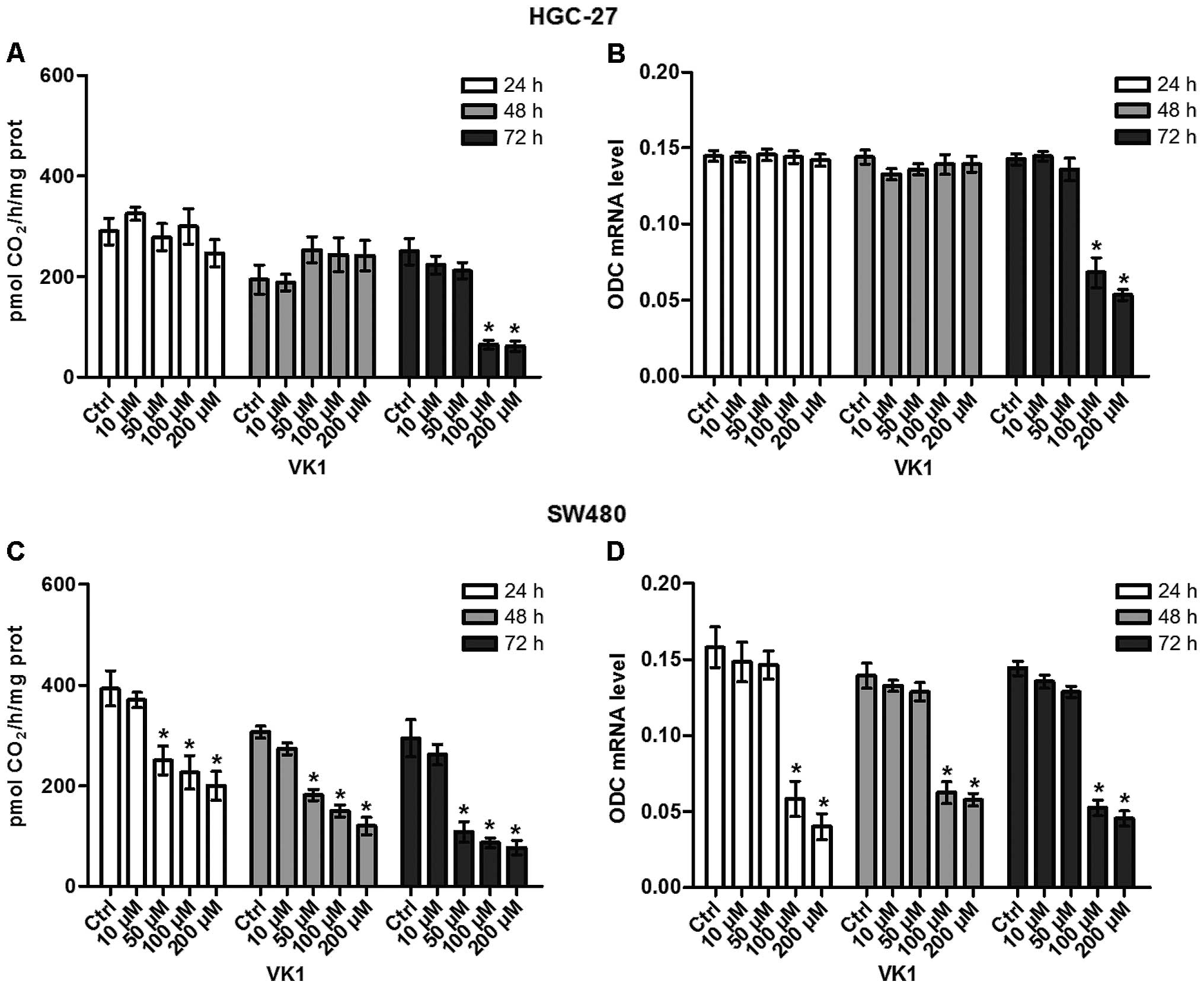|
1
|
Lepage C, Hamza S and Faivre J:
Epidemiology and screening of colon cancer. Rev Prat. 60:1062–1067.
2010.(In French).
|
|
2
|
Milner JA, McDonald SS, Anderson DE and
Greenwald P: Molecular targets for nutrients involved with cancer
prevention. Nutr Cancer. 41:1–16. 2001.
|
|
3
|
MacFarlane AJ and Stover PJ: Convergence
of genetic, nutritional and inflammatory factors in
gastrointestinal cancers. Nutr Rev. 65:S157–S166. 2007. View Article : Google Scholar
|
|
4
|
Hitomi M, Yokoyama F, Kita Y, Nonomura T,
Masaki T, Yoshiji H, Inoue H, Kinekawa F, Kurokohchi K, Uchida N,
et al: Antitumor effects of vitamins K1, K2 and K3 on
hepatocellular carcinoma in vitro and in vivo. Int J Oncol.
26:713–720. 2005.PubMed/NCBI
|
|
5
|
Amalia H, Sasaki R, Suzuki Y, Demizu Y,
Bito T, Nishimura H, Okamoto Y, Yoshida K, Miyawaki D, Kawabe T, et
al: Vitamin K2-derived compounds induce growth inhibition in
radioresistant cancer cells. Kobe J Med Sci. 56:E38–E49.
2010.PubMed/NCBI
|
|
6
|
Ogawa M, Nakai S, Deguchi A, Nonomura T,
Masaki T, Uchida N, Yoshiji H and Kuriyama S: Vitamins K2, K3 and
K5 exert antitumor effects on established colorectal cancer in mice
by inducing apoptotic death of tumor cells. Int J Oncol.
31:323–331. 2007.PubMed/NCBI
|
|
7
|
Lamson DW and Plaza SM: The anticancer
effects of vitamin K. Altern Med Rev. 8:303–318. 2003.PubMed/NCBI
|
|
8
|
Shearer MJ and Newman P: Metabolism and
cell biology of vitamin K. Thromb Haemost. 100:530–547.
2008.PubMed/NCBI
|
|
9
|
Yao Y, Li L, Zhang H, Jia R, Liu B, Zhao
X, Zhang L, Qian G, Fan X and Ge S: Enhanced therapeutic efficacy
of vitamin K2 by silencing BCL-2 expression in SMMC-7721
hepatocellular carcinoma cells. Oncol Lett. 4:163–167.
2012.PubMed/NCBI
|
|
10
|
Ozaki I, Zhang H, Mizuta T, Ide Y, Eguchi
Y, Yasutake T, Sakamaki T, Pestell RG and Yamamoto K:
Menatetrenone, a vitamin K2 analogue, inhibits hepatocellular
carcinoma cell growth by suppressing cyclin D1 expression through
inhibition of nuclear factor kappaB activation. Clin Cancer Res.
13:2236–2245. 2007. View Article : Google Scholar : PubMed/NCBI
|
|
11
|
Kanamori T, Shimizu M, Okuno M,
Matsushima-Nishiwaki R, Tsurumi H, Kojima S and Moriwaki H:
Synergistic growth inhibition by acyclic retinoid and vitamin K2 in
human hepatocellular carcinoma cells. Cancer Sci. 98:431–437. 2007.
View Article : Google Scholar : PubMed/NCBI
|
|
12
|
Du W, Zhou JR, Wang DL, Gong K and Zhang
QJ: Vitamin K1 enhances sorafenib-induced growth inhibition and
apoptosis of human malignant glioma cells by blocking the
Raf/MEK/ERK pathway. World J Surg Oncol. 10:602012. View Article : Google Scholar : PubMed/NCBI
|
|
13
|
Showalter SL, Wang Z, Costantino CL,
Witkiewicz AK, Yeo CJ, Brody JR and Carr BI: Naturally occurring K
vitamins inhibit pancreatic cancer cell survival through a
caspase-dependent pathway. J Gastroenterol Hepatol. 25:738–744.
2010. View Article : Google Scholar
|
|
14
|
Orlando A, Linsalata M, Tutino V, D’Attoma
B, Notarnicola M and Russo F: Vitamin K1 exerts antiproliferative
effects and induces apoptosis in three differently graded human
colon cancer cell lines. BioMed Res Int. Article ID 296721 (In
press).
|
|
15
|
Tokita H, Tsuchida A, Miyazawa K,
Ohyashiki K, Katayanagi S, Sudo H, Enomoto M, Takagi Y and Aoki T:
Vitamin K2-induced antitumor effects via cell-cycle arrest and
apoptosis in gastric cancer cell lines. Int J Mol Med. 17:235–243.
2006.PubMed/NCBI
|
|
16
|
Kawakita H, Tsuchida A, Miyazawa K, Naito
M, Shigoka M, Kyo B, Enomoto M, Wada T, Katsumata K, Ohyashiki K,
et al: Growth inhibitory effects of vitamin K2 on colon cancer cell
lines via different types of cell death including autophagy and
apoptosis. Int J Mol Med. 23:709–716. 2009.PubMed/NCBI
|
|
17
|
Igarashi K and Kashiwagi K: Modulation of
cellular function by polyamines. Int J Biochem Cell Biol. 42:39–51.
2010. View Article : Google Scholar
|
|
18
|
Moschou PN and Roubelakis-Angelakis KA:
Polyamines and programmed cell death. J Exp Bot. 65:1285–1296.
2014. View Article : Google Scholar
|
|
19
|
Nowotarski SL, Woster PM and Casero RA Jr:
Polyamines and cancer: implications for chemotherapy and
chemoprevention. Expert Rev Mol Med. 22;15:e32013. View Article : Google Scholar : PubMed/NCBI
|
|
20
|
Ramani D, De Bandt JP and Cynober L:
Aliphatic polyamines in physiology and diseases. Clin Nutr.
33:14–22. 2014. View Article : Google Scholar
|
|
21
|
Laukaitis CM and Gerner EW: DFMO: Targeted
risk reduction therapy for colorectal neoplasia. Best Pract Res
Clin Gastroenterol. 25:495–506. 2011. View Article : Google Scholar : PubMed/NCBI
|
|
22
|
Seiler N: Thirty years of
polyamine-related approaches to cancer therapy. Retrospect and
prospect Part 1 Selective enzyme inhibitors. Curr Drug Targets.
4:537–564. 2003. View Article : Google Scholar : PubMed/NCBI
|
|
23
|
Linsalata M and Russo F: Nutritional
factors and polyamine metabolism in colorectal cancer. Nutrition.
24:382–389. 2008. View Article : Google Scholar : PubMed/NCBI
|
|
24
|
Linsalata M, Orlando A, Messa C, Refolo MG
and Russo F: Quercetin inhibits human DLD-1 colon cancer cell
growth and polyamine biosynthesis. Anticancer Res. 30:3501–3507.
2010.PubMed/NCBI
|
|
25
|
Linsalata M, Cavallini A, Messa C, Orlando
A, Refolo MG and Russo F: Lactobacillus rhamnosus GG influences
polyamine metabolism in HGC-27 gastric cancer cell line: A strategy
toward nutritional approach to chemoprevention of gastric cancer.
Curr Pharm Des. 16:847–853. 2010. View Article : Google Scholar
|
|
26
|
MacKeigan JP, Collins TS and Ting JP: MEK
inhibition enhances paclitaxel-induced tumor apoptosis. J Biol
Chem. 275:38953–38956. 2000. View Article : Google Scholar : PubMed/NCBI
|
|
27
|
Orlando A, Linsalata M, Notarnicola M,
Tutino V and Russo F: Lactobacillus GG restoration of the gliadin
induced epithelial barrier disruption: the role of cellular
polyamines. BMC Microbiol. 14:192014. View Article : Google Scholar : PubMed/NCBI
|
|
28
|
Linsalata M, Notarnicola M, Tutino V,
Bifulco M, Santoro A, Laezza C, Messa C, Orlando A and Caruso MG:
Effects of anandamide on polyamine levels and cell growth in human
colon cancer cells. Anticancer Res. 30:2583–2589. 2010.PubMed/NCBI
|
|
29
|
Linsalata M, Russo F, Notarnicola M,
Berloco P and Di Leo A: Polyamine profile in human gastric mucosa
infected by Helicobacter pylori. Ital J Gastroenterol Hepatol.
30:484–489. 1998.PubMed/NCBI
|
|
30
|
Garewal HS, Sloan D, Sampliner RE and
Fennerty B: Ornithine decarboxylase assay in human colorectal
mucosa. Methodologic issues of importance to quality control. Int J
Cancer. 52:355–358. 1992. View Article : Google Scholar : PubMed/NCBI
|
|
31
|
Kayashima T, Mori M, Yoshida H, Mizushina
Y and Matsubara K: 1,4-Naphthoquinone is a potent inhibitor of
human cancer cell growth and angiogenesis. Cancer Lett. 278:34–40.
2009. View Article : Google Scholar : PubMed/NCBI
|
|
32
|
Adnan H, Antenos M and Kirby GM: The
effect of menadione on glutathione S-transferase A1 (GSTA1): c-Jun
N-terminal kinase (JNK) complex dissociation in human colonic
adenocarcinoma Caco-2 cells. Toxicol Lett. 214:53–62. 2012.
View Article : Google Scholar : PubMed/NCBI
|
|
33
|
Wei G, Wang M and Carr BI: Sorafenib
combined vitamin K induces apoptosis in human pancreatic cancer
cell lines through RAF/MEK/ERK and c-Jun NH2-terminal kinase
pathways. J Cell Physiol. 224:112–119. 2010.PubMed/NCBI
|
|
34
|
Wei G, Wang M, Hyslop T, Wang Z and Carr
BI: Vitamin K enhancement of sorafenib-mediated HCC cell growth
inhibition in vitro and in vivo. Int J Cancer. 127:2949–2958. 2010.
View Article : Google Scholar :
|
|
35
|
Gerner EW and Meyskens FL Jr: Polyamines
and cancer: Old molecules, new understanding. Nat Rev Cancer.
4:781–792. 2004. View
Article : Google Scholar : PubMed/NCBI
|
|
36
|
Casero RA Jr and Marton LJ: Targeting
polyamine metabolism and function in cancer and other
hyperproliferative diseases. Nat Rev Drug Discov. 6:373–390. 2007.
View Article : Google Scholar : PubMed/NCBI
|
|
37
|
Pegg AE: Regulation of ornithine
decarboxylase. J Biol Chem. 281:14529–14532. 2006. View Article : Google Scholar : PubMed/NCBI
|
|
38
|
Linsalata M, Orlando A and Russo F:
Pharmacological and dietary agents for colorectal cancer
chemoprevention: effects on polyamine metabolism (Review). Int J
Oncol. 45:1802–1812. 2014.PubMed/NCBI
|
|
39
|
Deloyer P, Peulen O and Dandrifosse G:
Dietary polyamines and non-neoplastic growth and disease. Eur J
Gastroenterol Hepatol. 13:1027–1032. 2001. View Article : Google Scholar : PubMed/NCBI
|
|
40
|
Seiler N and Raul F: Polyamines and
apoptosis. J Cell Mol Med. 9:623–642. 2005. View Article : Google Scholar : PubMed/NCBI
|
|
41
|
Davidson NE, Hahm HA, McCloskey DE, Woster
PM and Casero RA Jr: Clinical aspects of cell death in breast
cancer: The polyamine pathway as a new target for treatment. Endocr
Relat Cancer. 6:69–73. 1999. View Article : Google Scholar
|
|
42
|
Gao JH, Guo LJ, Huang ZY, Rao JN and Tang
CW: Roles of cellular polyamines in mucosal healing in the
gastrointestinal tract. J Physiol Pharmacol. 64:681–693. 2013.
|
|
43
|
Sui X, Kong N, Ye L, Han W, Zhou J, Zhang
Q, He C and Pan H: p38 and JNK MAPK pathways control the balance of
apoptosis and autophagy in response to chemotherapeutic agents.
Cancer Lett. 344:174–179. 2014. View Article : Google Scholar
|
|
44
|
Zhu L, Yu X, Akatsuka Y, Cooper JA and
Anasetti C: Role of mitogen-activated protein kinases in
activation-induced apoptosis of T cells. Immunology. 97:26–35.
1999. View Article : Google Scholar : PubMed/NCBI
|
|
45
|
Osada S, Osada K and Carr BI: Tumor cell
growth inhibition and extracellular signal-regulated kinase (ERK)
phosphorylation by novel K vitamins. J Mol Biol. 314:765–772. 2001.
View Article : Google Scholar : PubMed/NCBI
|
|
46
|
Manni A, Washington S, Hu X, Griffith JW,
Bruggeman R, Demers LM, Mauger D and Verderame MF: Effects of
polyamine synthesis inhibitors on primary tumor features and
metastatic capacity of human breast cancer cells. Clin Exp
Metastasis. 22:255–263. 2005. View Article : Google Scholar : PubMed/NCBI
|
|
47
|
Matsumoto K, Okano J, Nagahara T and
Murawaki Y: Apoptosis of liver cancer cells by vitamin K2 and
enhancement by MEK inhibition. Int J Oncol. 29:1501–1508.
2006.PubMed/NCBI
|
|
48
|
Duranton B, Holl V, Schneider Y,
Carnesecchi S, Gossé F, Raul F and Seiler N: Polyamine metabolism
in primary human colon adenocarcinoma cells (SW480) and their lymph
node metastatic derivatives (SW620). Amino Acids. 24:63–72.
2003.PubMed/NCBI
|
|
49
|
Mizuta T, Ozaki I, Eguchi Y, Yasutake T,
Kawazoe S, Fujimoto K and Yamamoto K: The effect of menatetrenone,
a vitamin K2 analog, on disease recurrence and survival in patients
with hepatocellular carcinoma after curative treatment: a pilot
study. Cancer. 106:867–872. 2006. View Article : Google Scholar : PubMed/NCBI
|



















